Buenos Aires (JTA) — In the center of this city, a siren immediately sounded at 2:50 p.m. local time on March 17. On the corner of Arroyo and Suipacha streets, in front of the former location of the city’s Israeli embassy, bells also sounded from the Mater Admirabilis Church.
After this a minute’s silence was observed. Then 22 names were read aloud to 2,000 or more people who gathered near a stage in a row.
That moment marks exactly when a car bomb exploded in front of the Israeli embassy here 30 years ago, killing 29 people (seven who were never publicly identified), injuring hundreds and surrounding Many buildings were damaged. Two years later, more than 80 people were killed in a similar bombing at the site of the AMIA Jewish Center building.
The embassy attack shocked the Argentine jury, and the outcome of the AMIA bombing enraged them – in the decades since, the perpetrators have not been fully brought to justice. Members of the Argentine government have been accused of concealing evidence that could criminalize Iranian-backed Hezbollah criminals.
In a sign of how seriously the Israeli government still takes the embassy bombing, Israeli Justice Minister Gideon Saar spoke at a memorial rally Thursday and railed against Iran and the nuclear deal between the United States and other world powers. platform used. Currently negotiating again.
“It was an attack against my country, and also against Argentina, the country where my father was born and raised,” Sa’ar said of the bombing. “It is our moral obligation to take action against the perpetrators of this heinous crime. We demand that they be prosecuted for their crimes against humanity… Iran’s sole objective with the nuclear deal is to free itself from sanctions, to obtain funds to strengthen terrorism and instability in the region and the world. Is. How long do we have to wait for justice to come? ,
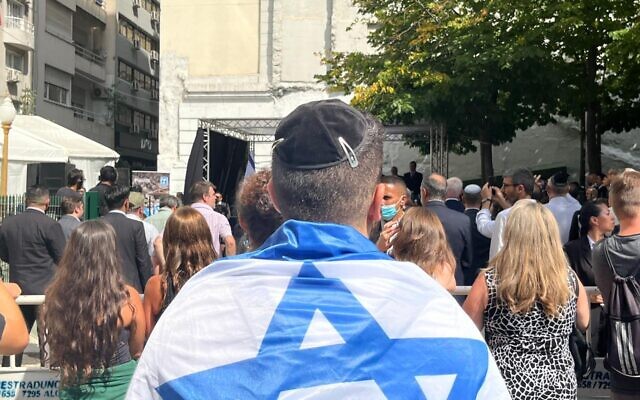
Protesters gather in Buenos Aires to mark the 30th anniversary of the bombing of the AMIA Jewish Center on March 17, 2022. (Juan Melamed/JTA)
Despite the late summer and heat, the atmosphere at the rally was calm and gloomy. Students from local Jewish schools, accompanied by their teachers, came with flags of Argentina and Israel, as a school activity. Some wore masks, others did not, but looked to maintain social distance.
Several Argentine cabinet members also participated: Justice Minister Martín Soria spoke to the crowd, and Foreign Minister Santiago Cafiero, Interior Minister Vado de Pedro, Defense Minister Jorge Tayana and Buenos Aires Mayor Horacio Rodríguez Larreta stood on stage.
We spoke with some of the attendees to hear their thoughts on the historic moment. His answers have been condensed and lightly edited for clarity.
marta stalker64, doctor
I am a doctor, with 40 years of experience. I live in front of the former embassy benchitch building, an old palace. i was there [points]On the fourth floor, when the bomb exploded.
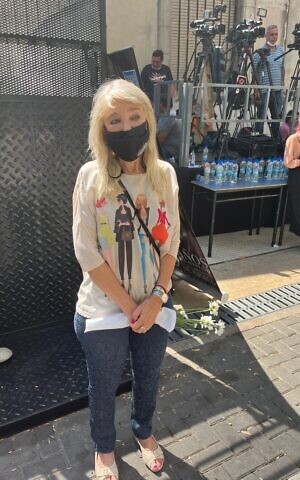
Marta Stocker. (Juan Melamed/via JTA)
I remember it was a very nice day, it was a pleasant day…a beautiful day like any other day…and then horror…. When I remember that day, I remember that dreadful memory. At first I thought it was a gas explosion, some household appliance.
I still remember the sound, the smell, the explosion, the death, the broken glasses, all the debris, all the sounds, I still remember every detail precisely because it was inscribed in me… it was beyond imagination.
I think of Ukraine and ask myself, “How do you recover after a bomb?” I mean, in Europe or Israel, maybe there are people who know they can get something out of the sky, but not here, not here…
I have come here to leave a flower for all those who lost their lives here and even for me. I am a very different person after the bomb.
Jonas Papier52, photographer and teacher
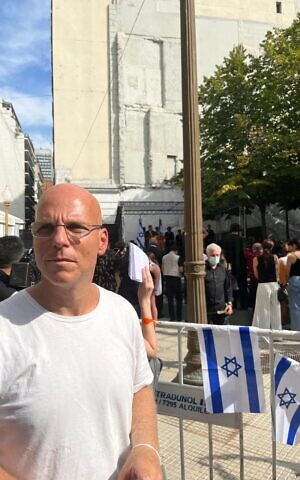
Jonas Papier, who was in the area during the attack, attended the remembrance ceremony. (Juan Melamed/JTA)
I was in a taxi in this area. We heard an explosion and I was shocked. A few minutes later, I asked the taxi driver to leave without knowing why. I started walking towards that place under the guidance of a column of smoke.
I have two friends who were staff at the embassy at the time and were inside the building when the explosion happened, Martin and Noam – magically I could see them both coming out of the rubble, beaten but in good general condition, probably shock In. He kept on helping others there.
I think 30 years later these wounds have turned us into different people. Because you can’t live with wounds and rancor, but also can’t forget, it has affected the way we interact with each other.
mariela ivaniere53, Marketing Professional
I was at Patio Bullrich, a shopping mall near here, at the time of the explosion. It was a very strange moment, we heard a sound but we had no idea that it was a bomb. It was impossible to have a bomb in Buenos Aires.
I moved towards the noise and then I found myself in front of the building. It was then that we realized that something dramatic and unique had happened.
unfortunately not much [changed], until 2 years later when AMIA was blown up by another terrorist attack. time has passed [after 1992] And there was a feeling that this was an attack on Argentina, not just the Jewish community.
There are wounds that never heal. This is a clear example of one of them.
Carolina Council48, deputy director of the Nathan Gesang Jewish School
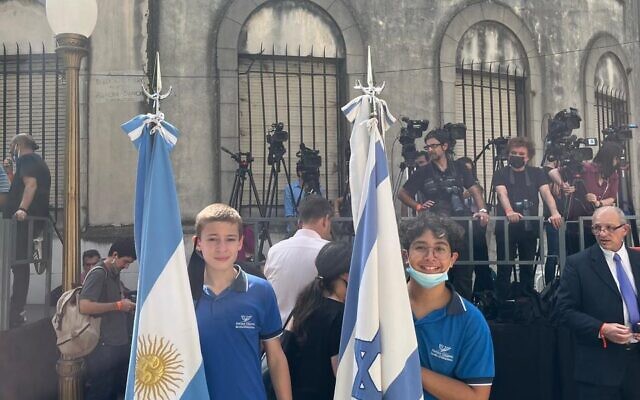
Students of Natan Gesang School participated in the rally. (Juan Melamed/JTA)
As a Jewish institution, we educate our students as people of integrity and pluralism based on knowledge of our history and traditions.
Participation in such demonstrations represents the practice of memory as a Jewish people, and being an active member of Argentine society, so that such a violent act for humanity does not happen again.
I think that time neither heals nor deepens wounds, these facts should be remembered so that they do not happen again. Memory and transmission from generation to generation promote the creation of a better world.
Jack Terpins73, President of the Latin American Jewish Congress
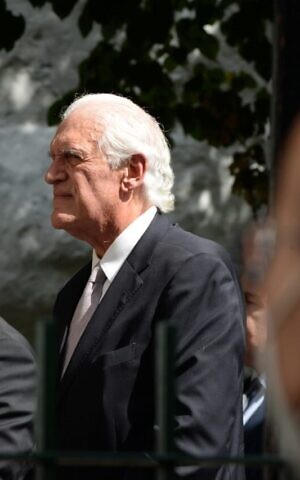
Jack Terpins, president of the Latin American Jewish Congress. (Courtesy of LJC/via JTA)
I don’t think there is a risk of another such attack in the region, but we need to work harder in every country in the region – it’s different in Argentina, Brazil, Mexico or Chile.
in my point of view [these countries stand with Israel]I am sure that no country in our region is close to terrorism. But we need the red alerts currently issued by Interpol on Iranians accused of the AMIA attack remain in place. We urge the competent authorities to maintain this.
And we want justice. Justice remains a priority for the integrity of Argentine society, for the safety of Jewish communities in the region, and for the memory of the victims.